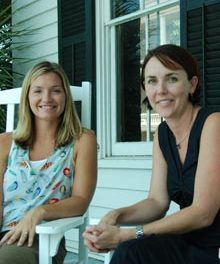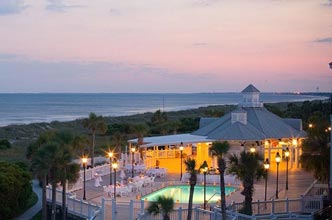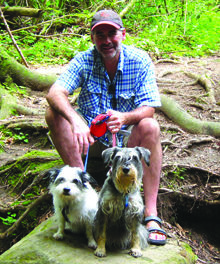Big Changes for the 6th Annual Beaufort International Film Festival
 Each year since its inception the Beaufort International
Each year since its inception the Beaufort International  Film Festival has grown. Ticket sales and attendance have doubled each year and submissions have poured in from across the globe as have the attending filmmakers. Each year the quality of entries across the various categories has continued to improve. A number of 2011 BIFF premiers continue to show and win awards on the international film festival circuit.
Film Festival has grown. Ticket sales and attendance have doubled each year and submissions have poured in from across the globe as have the attending filmmakers. Each year the quality of entries across the various categories has continued to improve. A number of 2011 BIFF premiers continue to show and win awards on the international film festival circuit.
And the filmmakers continue to spread the word on the intimate little festival in The Lowcountry. Word of mouth is viral in the film business. So far submissions for 2012 have come from Greece, Australia, Spain, the United Kingdom, Japan, India, South Africa, Canada and Peru.
2012 marks a milestone for BIFF. In current Hollywood terminology the festival is getting “a reboot.” 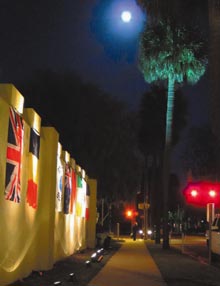 For the first time the Beaufort International film Festival is moving to downtown Beaufort. The festival, run by the Beaufort Film Society, moves to the Center for the Arts at the University of South Carolina’s historic Beaufort campus on Carteret Street. Not coincidentally, the Film Society’s new office is located just across the street. I sat down with BIFF Executive Director, Ron Tucker, and BFS President, Rebecca Berry to talk about taking the festival to the next level.
For the first time the Beaufort International film Festival is moving to downtown Beaufort. The festival, run by the Beaufort Film Society, moves to the Center for the Arts at the University of South Carolina’s historic Beaufort campus on Carteret Street. Not coincidentally, the Film Society’s new office is located just across the street. I sat down with BIFF Executive Director, Ron Tucker, and BFS President, Rebecca Berry to talk about taking the festival to the next level.
RAISING THE BAR
Mark Shaffer: There are a lot of changes in store for the 2012 festival. Let’s start with the biggest change, a new location – the Center for the Arts at USCB’s downtown campus.
 Ron Tucker: The biggest change is the new venue. We’re going from a 163 seat theater to a theater with nearly 500 seats. So our biggest push now is to get as many people in that theater as we can to fill those seats.
Ron Tucker: The biggest change is the new venue. We’re going from a 163 seat theater to a theater with nearly 500 seats. So our biggest push now is to get as many people in that theater as we can to fill those seats.
MS: This venue opens up a lot of possibilities.
RT: It does. They’re putting in a new screen and state-of-the-art surround sound system and we should have full use of the lobby and access to classrooms for breakout sessions and media interviews.
I also want to turn that whole lobby area into a movie theater lobby like we’ve had these last five years in the old Lady’s Island theater with the posters and concessions. I want to preserve the feeling of a small town festival.
MS: Moving the entire festival onto the USCB campus also means that, for the first time, The Beaufort International Film Festival is actually in Beaufort proper, just a few blocks from Bay Street.
Rebecca Berry: That’s right. No one has to deal with the bridge this time.
RT: Hopefully that will generate some foot traffic, although parking won’t be an issue. It’s a good fit 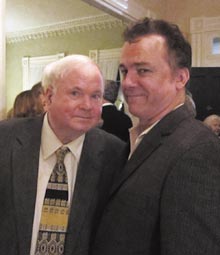 for this campus, which will eventually become an arts college. Hopefully, film will be part of that. We’re also working with the university to do some special rates for students. We’d really like them to come and see the student films from other schools, expose them to what’s going on in other programs and maybe inspire them. We’ve got some strong entries so far from places as diverse as New York University, the North Carolina School of the Arts and [Chapman University’s] Dodge College of Film and Media.
for this campus, which will eventually become an arts college. Hopefully, film will be part of that. We’re also working with the university to do some special rates for students. We’d really like them to come and see the student films from other schools, expose them to what’s going on in other programs and maybe inspire them. We’ve got some strong entries so far from places as diverse as New York University, the North Carolina School of the Arts and [Chapman University’s] Dodge College of Film and Media.
RB: The student film category’s been one of the strongest over the years.
MS: I’d agree with that. Have you noticed any former student participants submitting as professionals, yet?
RB: I don’t think so. Not yet, anyway,
RT: That would be something to look for. A lot of the student entries are thesis films, their film school grand finale. It would be great to have one of them return as a [professional] filmmaker. John Byron, the young man who won last year is a likely candidate. We’re going to read about him someday.
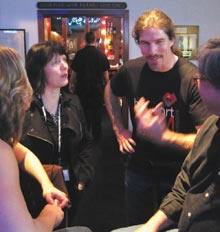 MS: The last few years have been special, no doubt, but 2010 and 2011 were standouts. Last year’s crop of short films was particularly strong and some pretty strong bonding took place among the filmmakers. We’ve been following some of them through the social media – Benjamin Busch (Bright), Seth Boggess and Natasha Warloe (Left Alone) – as they continue around the festival circuit. These films that premiered here have gone on to compete and win in major festivals like Cannes. Ben’s just been invited to Guam. They’ve gone around the country and the planet and they’ve won a lot of awards. That’s got to make you feel pretty good.
MS: The last few years have been special, no doubt, but 2010 and 2011 were standouts. Last year’s crop of short films was particularly strong and some pretty strong bonding took place among the filmmakers. We’ve been following some of them through the social media – Benjamin Busch (Bright), Seth Boggess and Natasha Warloe (Left Alone) – as they continue around the festival circuit. These films that premiered here have gone on to compete and win in major festivals like Cannes. Ben’s just been invited to Guam. They’ve gone around the country and the planet and they’ve won a lot of awards. That’s got to make you feel pretty good.
RB: It really does.
RT: Absolutely. Every film we had last year was a South Carolina premier and some were world premiers.
RB: Seth and Natasha’s Left Alone was a world premier. BIFF was their very first festival.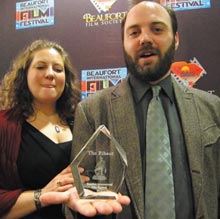
RT: If you go on their website you’ll see the laurel that reads “Winner, Beaufort International Film Festival.” And they haven’t forgotten that. Natasha’s said they compare every other festival to Beaufort. She says we set the bar pretty high and I think that’s a pretty nice compliment coming from a filmmaker.
THE BOUTIQUE EXPERIENCE
MS: This festival doesn’t work like other festivals – everything’s under one roof.
RB: It’s pretty well contained and organized.
MS: For lack of a better word, it’s a boutique festival. Everybody’s under one roof – the filmmakers, the audience, actors, writers, the media – and everybody interacts. For the filmmakers, it’s an instantaneous opportunity for feedback.
RB: And networking.
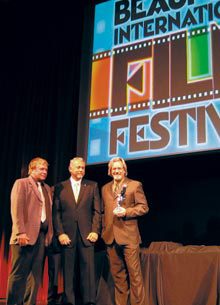 MS: Exactly. Between films they’re all talking shop and making connections, supporting each other’s work.
MS: Exactly. Between films they’re all talking shop and making connections, supporting each other’s work.
RT: This is not by accident. The first year we had the animation at a different venue and it felt disjointed. We didn’t like that sense of separation. We decided then to do everything under one roof. We look at festivals in other cities that may have five venues spread around town and each venue is divided into blocks of time. Attendees have to make choices about what they’re going to go see. By having it under one roof you can see them all.
MS: The major topic of conversation at this year’s festival had to do with the quality of the films. Everyone seems to agree that it’s gotten better every year.
RT: I’d like to think that’s because there’s a pretty positive buzz building about us that might attract filmmakers who didn’t submit before, people who didn’t have us on their lists. They shop festivals like we shop filmmakers.
RB: We still recruit a lot of the films we get.
MS: I want to touch on another aspect of moving the festival downtown: the economic impact.
RT: I think you’ll see more people venture downtown and make it into the shops and restaurants. We start early in the morning and run into the night, so I think this location will make it easier for people to slip off and come back quickly. They won’t have to worry about getting caught on the bridge anymore. And the need to move into a larger venue is a sure sign the festival is growing.
MS: It raises the whole profile. You’re not hidden away on a back street across the river anymore. You’re part of a well-known arts center on an historic campus on one of the most heavily traveled streets in the region, a block from your office.
RT: It definitely raises our visibility and the office location is no accident.
MS: Other changes for the 2012 festival include more awards.
RT: Each year we’ve done an informal survey where we’ve gotten feedback from our attendees. And 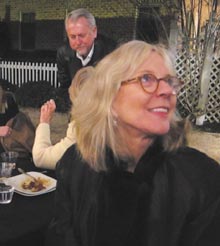 each year they’ve all requested a “Fan Favorite”…
each year they’ve all requested a “Fan Favorite”…
RB: Or an “Audience Choice” award.
RT: This year we decided to make the Audience Choice Award happen. Also as the quality of films has improved so has the acting and directing. From a festival director’s point of view, there’s a better chance the people involved with a film will attend if there’s a possibility of taking home an award. So this year we’ve added Best Performance, Best Director and Audience Choice awards.
We’ve raised the bar so high that we have to work hard not to slip. We’re not letting the grass grow under our feet. We want to grow the festival and now we’ve got the perfect place to do it.
The 6th Annual Beaufort International Film Festival runs February15th – 19th at the USCB Center for the Arts.
Keep up with festival news, events and buy event passes and tickets online at www.beaufortfilmfestival.com
Find out more about the Beaufort Film Society online at www.beaufortfilmsociety.org
Email Mark Shaffer at backyardtourist@gmail.com

